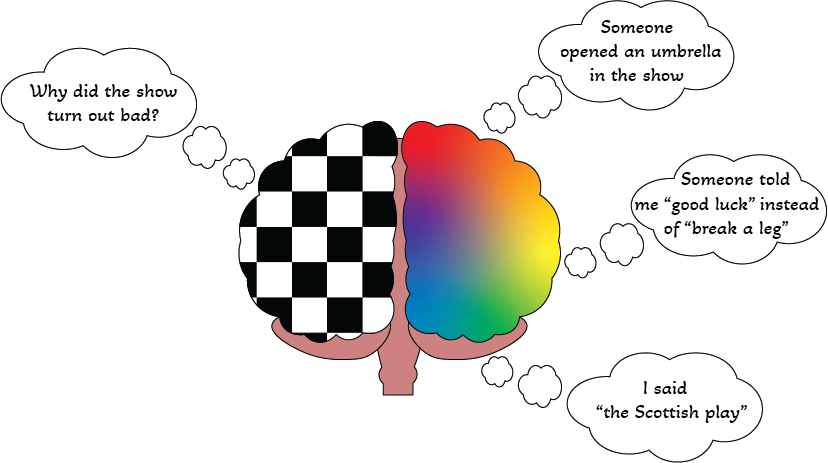Social Science and Fine Arts teacher Donna Walker know superstitions aren’t rational. In fact, she teaches her AP Psychology students that superstitions come from a person’s subconscious need to explain an event. However, even Walker subscribes to at least one superstition.
“Purists would say that since we were in the building that actually houses the theater,” Walker said. “That you were not permitted to say the name of a particular famous Scottish play by Shakespeare.”
In this instance, Walker herself is a purist.
According to Statista, about 65% of Americans consider themselves to be superstitious. Almost 10% of those Americans believe they are very superstitious.
Walker said that the root of superstitions is to find a reason for something that happened.
“You’re attributing the reward or the outcome to something that actually has nothing to do with the outcome,” Walker said. “And that’s how superstitions are initially born.”
Most superstitions are created due to an unfortunate event that humans need an explanation for something.
“[Your] subconscious also has this innate need to explain it,” Walker said. “This is called just world phenomenon where humans have a tendency to believe that you get what you deserve and you also deserve it.”
One main area that tends to have a lot of superstitions would be the theater department because much can go wrong when performing. For example, the origin of the saying “break a leg” was to use reverse psychology to create a positive outcome.
“Theater has so many superstitions,” Walker said. “For example, you don’t say good luck, you say break a leg.”
Like theater superstitions, sophomore Sallee Rosen remembers a superstition that she learned when she was little.
“I had a babysitter and we were passing by a graveyard once and she went like, ‘Oh, you’re not supposed to breathe when you’re going by a graveyard,'” said sophomore Sallee Rosen.
Rosen got these superstitions from both her parents and online which allowed her to explore her beliefs.
“It probably has to do with the Internet mostly,” Rosen said. “But sometimes my parents would tell me about their superstitions which kind of rubbed off on me.”
Most parents pass on superstitions to their children because it makes others feel more confident and comfortable about themselves.
Freshmen Thomas Bonos mentioned that most of his superstitions are from and shared through his close friends on his soccer team.
“My teammates share most of my superstitions because I’ve been with them for a while,” Bonos said. “So for example, we all tape our wrists before the game in a certain way. That’s the kind of superstition that we all do.”
When finding a reason for a good outcome, Bonos decided to believe in more superstitious tendencies to ensure the same outcome.
“[Superstitions are] just something I’ve been doing,” Bonos said. “Once I do it, I play well and then I just keep doing it.”
Last year, Bonos was in Texas right before an important match. For the dinner before the game, Bonos looked at the menu at the restaurant and didn’t see anything that stood out to him. He saw that they were serving sea bass and rice, so Bonos ordered it. The next day, Bonos played very well. He scored 3 goals which allowed him and his team to advance to the next level.
Bonos feels as if the good outcome for the game confirms that the sea bass and rice helped him win.
“I think it’s just a mental thing,” Bonos said. ” I just can’t do without it and I feel like I’m going to play badly.”
Like Bonos, Rosen feels more confident in herself when completing difficult tasks using her superstitions. One main way to manifest these positive feelings is through wearing crystals.
“If I’m really nervous about something or if I’m just not feeling well, I will specifically choose one because I think [the crystal] is really pretty,” Rosen said.
Rosen said that she had seen others experiencing pushback about their superstitions, primarily online, by those who tease them due to their beliefs.
“Especially online, people are a little crueler or they just kind of joke about it and make fun of it,” Rosen said.
When speaking to her friends, Rosen realizes that most don’t fully consider themselves superstitious, yet they still believe in some superstitions like making a wish at 11:11.
Rosen thinks that most have their own opinions and beliefs, but people don’t feel comfortable sharing due to social media hate or exclusion.
“Everyone has superstitions,” Rosen said. “I just don’t know if many people talk about it.”













